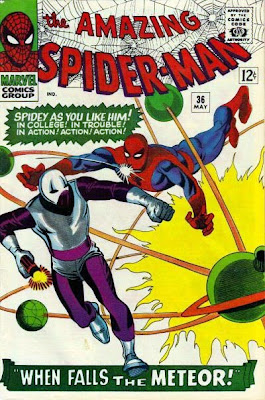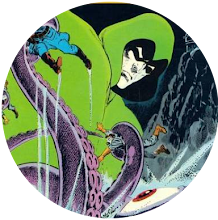But you couldn't say the same of Stan Lee and Steve Ditko. Somehow, way back in the 1960s, they managed to predict it all as they gave us a villain created by a meteor and calling himself The Looter.
How did they know the two events would be so linked?
I have no idea.
 |
| Perseid Pete Runs awok. |
In Amazing Spider-Man #36, Norton G. Fester's doing a Fred Hoyle, convinced that meteors hold the secret of life itself. Unlike Hoyle, his experiments on one make it release a gas that grants him super-human strength. Also unlike the late Professor Hoyle, he turns to crime.
|
Mad! Mad! Completely mad!
|
|
Mad! Mad! Completely mad!
|
|
Mad! Mad! Completely mad!
|
Much as we all love Spider-Man and much as we all love Steve Ditko, you can't get away from it, the Looter's a terrible villain, lumbered with a mediocre costume, strength as his only super-power, and a lame motivation of stealing a meteorite. The tale also suffers from the less than clever resolution that Spider-Man wins-through simply by hitting the villain. It'd be fair to say the issue's plotting isn't complex and goes against Stan Lee's early rules that Spider-Man should beat foes as much by wit as power. Clearly Ditko, who by this stage was being left alone to plot things as he saw fit, took a different view.
Where the issue's more interesting is it features the very early days of Peter Parker's relationship with Gwen Stacy. Judging by some of Parker's thoughts, it may even be the first time he's ever spoken to her. What leaps out at you though is that this isn't the wholesome girl we remember from later years. The truth is that, as well as somehow managing to look more evil than the tale's official villain, she really does come across as a complete and total madwoman, endlessly stalking Parker, never thinking of anything but him and spontaneously bursting out in delirious fits of maniacal laughter. Frankly, if you met someone like her in real life, you'd take out a restraining order.
So, there you have it, a tale where the love interest seems more threatening than the villain, and the creators knew nearly fifty years ago of the mysterious link between meteor showers and civil disorder. What would've happened had Steve Ditko not left the strip within two issues of this one? Who can know? Would Gwen Stacy have been revealed as the Green Goblin? Who can know? Do I have the slightest clue how to end this post? Who can know?












































































1 comment:
We've talked about this before, haven't we? How Gwen Stacy and all the blonde-female creations for his Charlton horror comics were probably based on the same maniacal female from Ditko's own life? The Stacy of the Ditko years is so self-centred and treacherous, in fact, that she actually tends to foreshadow the sort of spoiled, frivolous, sociopathic young shrews that have come to plague US high schools and universities over the past two decades or so.
Post a Comment